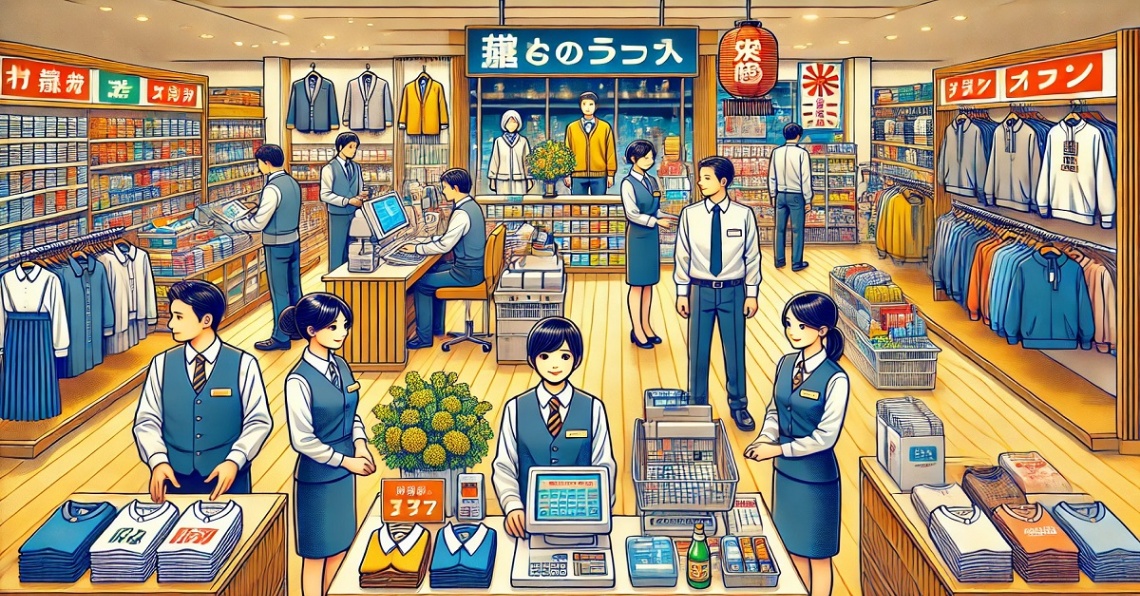Retail jobs in Japan are known for their high customer service, organization, and efficiency standards.
It is a competitive but rewarding industry to work in.
About Retail Jobs in Japan
There are thousands of part-time and full-time retail job openings across major cities like Tokyo, Osaka, and Kyoto.
These positions offer stable earnings, flexible schedules, and valuable experience in a structured work environment.
Retail jobs in Tokyo, in particular, are highly sought after due to the city’s high volume of stores, shopping malls, and international brands.
Major employers in the retail sector include:
- Convenience Stores (Konbini): 7-Eleven, FamilyMart, Lawson
- Supermarkets: AEON, Seiyu, Ito Yokado
- Department Stores: Isetan, Mitsukoshi, Takashimaya
- Discount and General Stores: Don Quijote, Daiso, Loft
- Fashion Brands: Uniqlo, GU, H&M, Zara
These companies frequently hire both Japanese and foreign workers, making retail a practical employment option for those looking to work in Japan.

What Jobs Are Available in Japan’s retail sector?
The retail sector employs millions of workers across convenience stores, department stores, supermarkets, and specialty shops.
Retail jobs vary depending on experience, Japanese proficiency, and work status.
Retail jobs in Japan for foreigners include both front-line customer service roles and behind-the-scenes positions.
Entry-Level Retail Jobs in Japan
These roles are suitable for foreigners with little or no experience and require basic training.
- Cashier: Operates the cash register, processes transactions, and applies discounts or promotional offers.
- Store Clerk: Stocks shelves, organizes displays, and assists customers with product inquiries.
- Inventory Staff: Manages stock levels, unloads shipments, and restocks products.
Retail Jobs Requiring Experience or Higher Japanese Proficiency
These jobs require some level of experience, sales knowledge, or Japanese fluency (JLPT N3 or higher).
- Sales Associate: Recommends products, helps customers, and works towards sales targets.
- Floor Manager: Oversees store operations, supervises employees, and ensures smooth daily activities.
- Customer Support Staff: Handles customer inquiries, complaints, and product returns.
For part-time jobs in Japan, most stores train workers on-site, making it possible to start with minimal retail experience.
However, knowledge of basic Japanese phrases, currency handling, and politeness levels can be beneficial.
How Much Can You Earn in Japanese Retail Jobs?
Earnings in Japanese retail jobs depend on location, company, and work hours.
Some positions offer additional benefits such as employee discounts, transportation stipends, and seasonal bonuses.
Part-Time Jobs in Japan (Arubaito)
- Average wage: ¥1,000–¥1,500 per hour
- Night shift rates: Some stores pay 25% more for late shifts (¥1,250–¥1,875 per hour)
- Work hours: 20-28 hours per week (for student visa holders)
- Best for: Students, travelers, or those looking for extra income
Full-Time Retail Jobs in Japan
- Annual salary: ¥2.5 million – ¥4 million
- Store managers: ¥5 million+ per year
- Benefits: Paid leave, bonuses, and employee discounts
- Best for: Workers seeking long-term stability in Japan
Additional Earnings and Benefits
Retail workers in Japan often receive additional benefits such as:
- Commuter Allowances: Many stores reimburse transportation costs for employees.
- Overtime Pay: Employees working beyond 8 hours per day receive overtime rates (usually 25% more).
- Seasonal Bonuses: Some companies provide summer and winter bonuses, increasing annual earnings.
- Employee Discounts: Stores often offer special discounts on merchandise to their workers.
For foreigners, retail jobs provide a stable income and financial security, especially for those looking to save money while living in Japan.
Requirements for Retail Jobs in Japan
Most retail jobs in Japan for foreigners require:
Japanese Proficiency:
- Customer-facing jobs require JLPT N4–N3 or higher.
- Some inventory and stock positions do not require Japanese skills.
Valid Work Visa:
- Student Visa: Up to 28 hours per week allowed.
- Working Holiday Visa: Allows full-time work for 6–12 months.
- Specified Skilled Worker Visa: For those seeking long-term employment.
Workplace Skills:
- Ability to handle money, follow schedules, and maintain store cleanliness.
- Physical stamina for standing long hours and stocking products.
Many companies provide on-the-job training, so prior retail experience is not always necessary.
Work Conditions in Japanese Retail Jobs
Retail work conditions vary depending on store type.
Convenience stores and supermarkets operate long hours, while department stores and specialty shops have fixed schedules.
| Retail Type | Work Hours | Notes |
|---|---|---|
| Convenience Stores | 24/7 shifts | High demand for night shift workers |
| Supermarkets | 6 AM – 11 PM | Requires stocking duties in early morning |
| Department Stores | 10 AM – 8 PM | Fixed working hours with few overtime shifts |
| Fashion Stores | 10 AM – 9 PM | High interaction with customers and sales goals |
| Discount Stores | 24/7 in some locations | Heavy stocking work and rush-hour crowds |
For part-time jobs in Japan, weekend shifts and evening hours are common due to higher customer traffic.
Where to Apply for Retail Jobs in Japan?
Retail job listings can be found online, in-store, or through recruitment agencies.
- TownWork: Part-time job listings.
- GaijinPot Jobs: Retail jobs for foreigners.
- Hello Work: Government job center for residents.
- Uniqlo Careers: Fashion retail jobs.
- Don Quijote Jobs: Discount store positions.
- 7-Eleven Recruitment: Convenience store work.
Many supermarkets, convenience stores, and local shops accept direct applications.
Bringing a resume (履歴書 - Rirekisho) increases the chances of getting hired.
Dealing With Challenges of Retail Jobs in Japan
Foreigners may face several challenges, especially those new to the country or the retail sector.
1. Language Barrier
- Learn Key Phrases: Memorize basic customer service Japanese, such as greetings and transaction phrases. For example:
- いらっしゃいませ (Irasshaimase) – "Welcome!"
- お会計は○○円になります (Okaikei wa ○○ en ni narimasu) – "Your total is ___ yen."
- ありがとうございました (Arigatou gozaimashita) – "Thank you!"
- Use Translation Apps: Apps like Google Translate, Yomiwa, or Papago help understand product labels and announcements.
- Take Japanese Classes: Many cities offer affordable or free language courses for foreign workers.
2. Physical Demands and Long Hours
- Wear Comfortable Shoes: Invest in cushioned, non-slip shoes to reduce foot strain.
- Take Short Breaks: Use scheduled rest breaks to sit, stretch, and drink water.
- Strengthen Your Body: Light exercises like stretching and walking help improve stamina.
- Choose the Right Shift: Night shifts offer higher pay but require adjusting sleep schedules.
3. Strict Work Culture and Rules
- Arrive Early: Arriving 10-15 minutes before a shift helps avoid lateness.
- Observe Senior Workers: Watch how experienced Japanese employees interact with customers.
- Follow the Manual: Most retail chains provide detailed training manuals on proper behavior.
- Stay Professional: Even when dealing with difficult customers, remain calm and follow company policies.
4. Low Wages for Entry-Level Jobs
- Work During Peak Hours: Some stores offer higher pay for night shifts and holidays.
- Choose a Store with Benefits: Some retailers provide transportation allowances, meal stipends, and bonuses.
- Apply for Promotions: Hardworking employees can become full-time staff or managers, increasing their salary.
5. Dealing with Difficult Customers
- Follow Store Policy: Stick to company rules when handling complaints.
- Stay Calm and Polite: Avoid arguing and use polite language to de-escalate conflicts.
- Ask a Supervisor for Help: If a customer becomes aggressive, call a manager or senior staff member.
Conclusion
Retail jobs in Japan provide financial stability, flexible schedules, and career opportunities.
Whether working in convenience stores, department stores, or fashion outlets, retail jobs in Japan for foreigners are widely available.
Foreign workers can secure a steady job in Japan’s retail industry by understanding salary expectations, visa requirements, and application methods.






